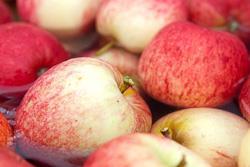
Asia is set to become New Zealand’s largest apple export market sometime in the next few years, according to Pipfruit New Zealand CEO Peter Beaven.
That prediction came following the industry body’s annual conference and AGM, held last week in Nelson on New Zealand’s South Island.
“There’s a focusing of the New Zealand industry on the Asia-Pacific basin,” he told Fruitnet.com. “The numbers are saying to me that the Asian markets will become our largest export market, replacing Europe. The growth, opportunities and closeness of Asia, and the growth of the middle class, afford significant opportunities.”
Exports to Asia accounted for 29 per cent of New Zealand’s total pipfruit exports this season, up from 19 per cent last year. Exports to Europe made up 38 per cent of the total this season, down from 41 per cent last year.
Mr Beaven said Europe and North America would undoubtedly remain important markets for New Zealand apples, but were competing against destinations like India, which has seen a doubling in trade over the last four years to 330,000 cartons (18kg) this season, despite a 50 per cent tariff.

Market access
A number of issues were up for discussion at last week’s conference, at the core of which was market access in Asia and Australia. Of particular significance was discussion of access to mainland China.
“China has imposed on New Zealand a requirement that if it intercepts woolly apple aphid, codling moth or fire blight `in any shipments` it will suspend all trade,” Mr Beaven said.
“It’s a very high risk environment to be trading in, and we don’t think there’s any scientific justification for it. We’re concerned it was not unconnected with our free trade agreement (FTA) with China; this requirement was imposed a few months after that came into effect.”
Viable access to Japan was also under discussion. Mr Beaven explained the treatments required of New Zealand apples meant the country did not have any meaningful access to Japan.
For the Australian market, the World Trade Organisation (WTO) ruling on quarantine restrictions for New Zealand apples has now been pushed back to mid-August.
“The timing is less than propitious, with a general election `in Australia` a week after the report is released,” stated Mr Beaven. “It’s bound to become a political football during the campaign, unfortunately.”
He added it was very likely the Australian apple industry would push for an appeal if the ruling was in favour of New Zealand, which would push back a final decision to March next year.
Negotiations for apple access to South Korea have also commenced. Mr Beaven said Korea’s strong agricultural lobby may make negotiations and subsequent access difficult. He was keen to point out to Korea’s apple industry the opportunities for collaboration with New Zealand.
“We’re keen to get access, but as part of arrangements with places like Korea and India, we’re keen to partner up with their industries and act responsibly,” he explained. “We’re counterseasonal; we won’t overrun their markets. We need to get those messages out into those industries and allay the concerns they have. It’s understandable them being threatened by `a supplier like` China or the US, but we’re not a threat.”
Emissions trading
Conference attendees also heard from Dr Nick Smith, New Zealand’s Minister for the Environment and Climate Change Issues, who spoke about the government’s upcoming emissions trading scheme.
“We have a view in the horticulture industry that we are a high cost producer a long way from our markets; why further disadvantage us against our competitors, who have no immediate intentions of introducing similar emissions schemes? It erodes our competitive advantage,” said Mr Beaven.
“The Minister responded that as a responsible country, New Zealand had to be coming to the party and meeting our obligations `under the Kyoto Protocol`. `He said` in the long-term, unless we started to participate, we wouldn’t be seen as a responsible country. That definitely has some validity.”
Mr Beaven said that by the end of the conference, most people had a good understanding of why the government felt it needed to go ahead with the scheme.
The immediate effects on the horticulture industry will be increased fuel and cold storage prices, but the changes will be phased in gradually.
Marketing
Some significant developments also came out of Pipfruit New Zealand’s AGM last Wednesday. A resolution was passed at the meeting giving the body authority to explore industry-wide marketing strategies for Braeburn apples in Europe.
The resolution read: “This meeting mandates Pipfruit New Zealand to explore all avenues, including the Horticultural Export Authority (HEA), to improve grower returns from Braeburn exports to Continental Europe.”
“It gives us the option; we haven’t agreed to do it yet,” said Mr Beaven. “`If we were to do it`, we would develop a marketing strategy, that would then be endorsed by the HEA, then anyone exporting to that territory must agree to the strategy. It would mean we could limit the class of fruit that gets sent, and everyone agrees to promotions.”
Mr Beaven said there was no guarantee Pipfruit New Zealand would go down that road, but there was a general recognition in the industry that the move from a single desk under Enza in 2001 to a completely open system “hasn’t worked”.
“Somewhere between those two extremes is where we need to be. There need to be some rules, whether they’re voluntary or required.”
New Zealand Braeburn pricinghas been strugglingthe last few seasons in Europe, the major market for the variety, prompting acooperative marketing plan trialin the region this season.



